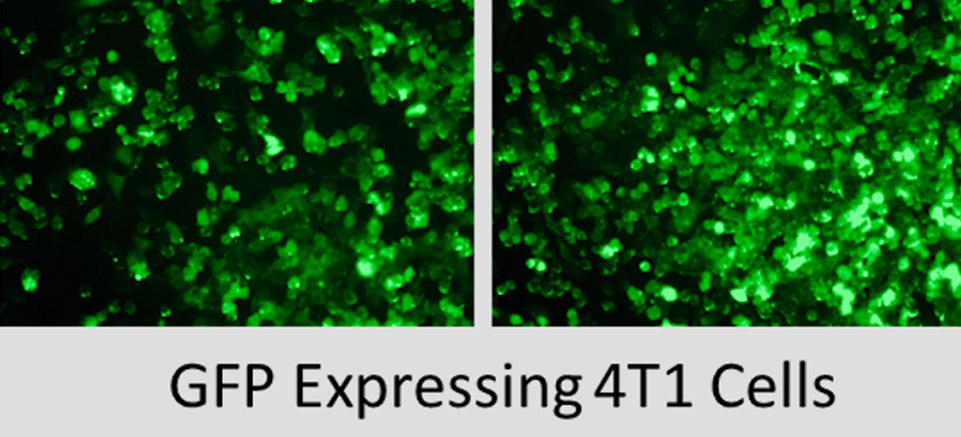Tumor Cells Expressing GFP

Tumor studies performed in mice are helping the medical community learn better ways to diagnose and treat cancer in humans. One of the most virulent tumors is the 4T1 tumor, a mouse tumor of the mammary gland. It is akin to stage IV human breast cancer, and serves as a powerful research tool for those taking a critical look at breast cancer. 4T1 is a highly malignant, poorly immunogenic, and spontaneously metastatic tumor, with low long-term survival even after immune therapy in immune-competent mice.
In 2007, a study was completed in mice to evaluate the ability of attenuation of regulatory T cells and immune stimulation to reject metastatic 4T1 breast cancer. By the time the main 4T1 tumor was evident in the mouse tissues, the tumor had already metastasized to various different organs, and removal of the main tumor did not affect the subsequent tumors that had spread throughout the body, with most of the mice succumbed to pulmonary metastasis. However, post treatment, the long term survival increased to over 125 days, as well as tumor rejection in 65% of the mice. Toxicity and autoimmunity were not observed in this treatment either, providing an excellent foundation for future breast cancer treatment in humans.
At FCSL we have performed immunophenotyping on 4T1 tumors looking at a variety of lymphocyte subsets. Stayed tuned for more information and our poster presentation this fall at PANWAT, taking place this year October 14-15 at Seattle Genetics, Inc. in Bothell, Washington which will dive into this tumor type plus a whole lot more!
References
“4T1.” Wikipedia, Wikimedia Foundation, 3 July 2018, en.wikipedia.org/wiki/4T1.
Chen, Li, et al. “Rejection of Metastatic 4T1 Breast Cancer by Attenuation of Treg Cells in Combination With Immune Stimulation.” Molecular Therapy, vol. 15, no. 12, Dec. 2007, pp. 2194–2202., doi:10.1038/sj.mt.6300310.

